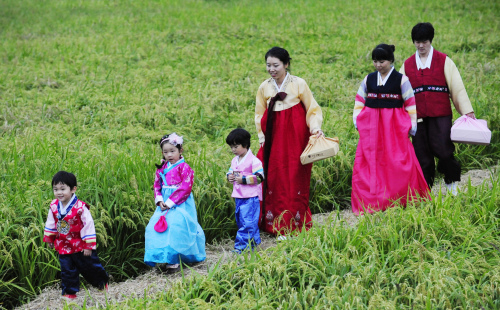With Chuseok a mere two days away, families are busy preparing for the festivities. But depending on your gender, that burden could fall solely on you.
Most think of holidays as a celebration in this case a festival to traditionally celebrate a good harvest over the past year. But for women, the seemingly never-ending preparations for Chuseok give them something else to look forward to: the end of the holiday season.
This is the case for most families. A typical picture of Chuseok is a scene in which the men are gathered around the television or talking over a game of cards, with the women chatting in the kitchen preparing jeon ― a Korean-style pancake with a wide variety of added ingredients.
In the past, newly-married women would dread going to their in-laws during Chuseok, for fear of the workload.
“When I first started preparing for the holidays it was really tiring. No matter how hard I worked, I didn’t see an end in sight. I worked to the point where my legs would swell up,” said No Eun-jeong, who has been married for over 20 years.
Some husbands were barred from helping their wives, for fear of repercussions from their parents.
“When we first got married, no matter how difficult the workload was, my husband never helped because he had to make sure his parents were happy. He felt that by not helping with the work, he was in fact helping me in the long run,” said Lee Sung-ok.

A family dressed in colorful hanbok walk through rice paddies on a hometown visit for huseok holiday in Changnyeong, South Gyeongsang Province, Sunday. (Park Hae-mook/The Korea Herald)
It is normal for a new bride to rarely see her own parents.
“I had to meet the in-laws, get assigned a role to do this to do that, go shopping to make something for the in-laws, so I got sad about not being able to visit my own family,” said a woman surnamed Kim.
And now, Korean women, tired of the sexism that has been a part of their culture for so long, are speaking up.
“I wish my husband would help me with making jeon,” said Ahn Jung-hye.
“I’d like it if my husband would take care of our baby, not just on the holidays, but the weekends as well,” said Miyuki Takashima, a Japanese woman married to a Korean man.
“Instead of the men just sitting around with each other, why not help set the table or help with the dishes so the woman can finish earlier,” said Kim In-sook. “I’m sure all women want that, we’re not asking for a lot.”
And it seems Korean men of all generations are starting to hear the call of their wives and are walking away from the traditional cultural belief that it is the woman’s duty to slave away in the kitchen, and their right to not even lift a finger.
“He is on the helpful side. He doesn’t completely ignore what I do, if he did I’d be quite upset,” said Ahn.
“Usually he plays baduk, but this year he said that he would take the children to go watch a movie, so I told him to go,” said No.
“If I think about the holidays and compare the past to now, he has improved a lot. I would never have imagined him helping me with the shopping until five to six years ago when he started helping me,” said Lee.
And for many the traditional divide in roles has already disappeared.
Takashima felt that Chuseok was just another holiday with the family.
“I asked if I could come early and help out with the preparations but my in-laws told me I can just enjoy myself. It made me think that it will not be laborious,” she said.
She also said that this would be her first Chuseok with her in-laws.
Some younger generations do not even celebrate Chuseok in the traditional way.
“Nowadays, a lot of the younger generations do not go back to their hometown. A lot of them choose to stay in Seoul and meet friends,” said Hong Jin-su.
“For the younger generation, gender roles are not as defined as their elders,” he said.
So how do foreign countries compare with Korea?
“I don’t think of women cooking in the kitchen, I think of men cooking in the kitchen,” said Micola Jackson from England.
“I think (gender roles during the holidays) are changing. They certainly are where we are from,” she said.
“That’s the stereotype (traditional gender roles), but with my family it’s different. My dad was the one who always cooked. My mom didn’t do that,” said Andre Fortes from the United States.
“Chuseok for me is the same as Thanksgiving when I was growing up. My mother and grandmother cooked the food. My dad, for the most part, watched TV,” said Paul from the United States.
Despite the very traditional start that his family had, they have also changed.
“My father is retired so now he does most of the cooking and cleaning, and my mother still works. So they literally switched roles,” he said.
By Robert Lee (rjmlee@heraldcorp.com)





![[KH Explains] How should Korea adjust its trade defenses against Chinese EVs?](http://res.heraldm.com/phpwas/restmb_idxmake.php?idx=645&simg=/content/image/2024/04/15/20240415050562_0.jpg&u=20240415144419)
